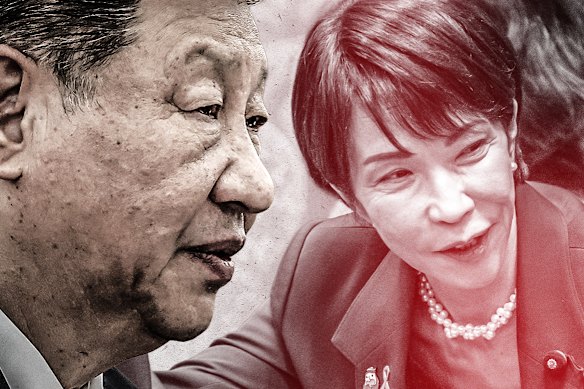
Japanese Prime Minister Sanae Takaichi has faced a significant backlash from China following her comments regarding potential military action in response to a crisis in the Taiwan Strait. Takaichi indicated that Japan might deploy its armed forces if China were to take military action against Taiwan, a self-governing democracy that Beijing claims as its territory. This assertion has sparked a fierce diplomatic confrontation between the two nations.
In the days following her remarks, Beijing’s response was swift and intense. The Chinese government summoned Japan’s ambassador to formally protest Takaichi’s comments. Additionally, China suspended the release of at least two upcoming Japanese films, signaling its displeasure. Wang Yi, China’s Foreign Minister, has also indicated he will not engage with Takaichi during the upcoming G20 Summit.
On the maritime front, tensions escalated as the Chinese Coast Guard conducted a “rights enforcement patrol” in disputed waters around the Senkaku Islands, which are controlled by Japan but claimed by China as the Diaoyu Islands. This move underscores the growing military assertiveness in the region, particularly concerning Taiwan.
China’s actions have extended beyond diplomatic protests, targeting Japan’s economy through its influential tourism sector. The Chinese government has urged its citizens to avoid travel to Japan, a recommendation supported by major Chinese airlines that are offering full refunds on flights scheduled before the end of the year. This decision has provoked concerns in Tokyo, especially as Chinese tourists accounted for a substantial portion of Japan’s tourism revenue, spending around $3.8 billion in the most recent quarter.
The impact of this situation is already visible in the stock market. Shares in major Japanese companies, including Shiseido, experienced declines of between 9 and 11 percent following the news of the escalating tensions.
Despite the mounting pressure from China, Takaichi has not backed down from her position. Instead, on Monday, Japan dispatched a senior official from its foreign affairs department to Beijing in an attempt to de-escalate the situation. This diplomatic effort reflects the challenges Takaichi faces as she navigates her role as a national security advocate early in her leadership.
As the situation develops, both nations must manage their respective positions while considering the broader implications for regional stability and international relations in the Asia-Pacific area.







